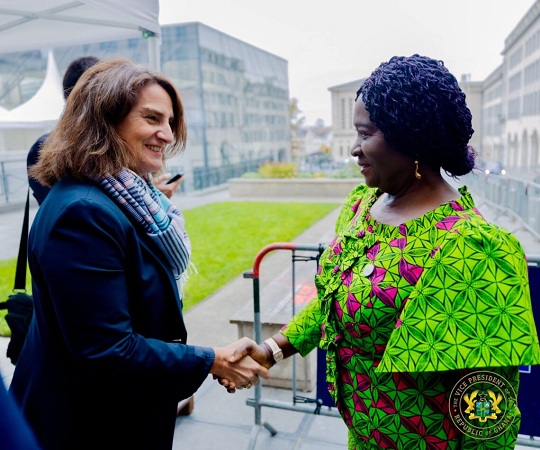Vice President Professor Naana Jane Opoku-Agyemang has reaffirmed that Ghana’s cocoa grading and quality control systems remain among the most rigorous in the world, stressing that ongoing reforms at the Ghana Cocoa Board (Cocobod) are aimed at ensuring fairness and strengthening investor confidence.
She made the remarks on the second day of the Global Gateway Forum in Brussels, during the Sustainable Cocoa Initiative Scale-up Session, where she spoke on pricing, value addition, and improving farmers’ livelihoods.
The Vice President said Ghana’s journey—from Tetteh Quarshie’s first cocoa beans to the work of over 800,000 farmers today—reminds the nation that sustainability must go hand in hand with fairness.
“Global demand for cocoa remains strong, and African consumption is on the rise. The greater risk lies not in overcapacity, but in underinvestment and failing to capture the growing value of the market,” she emphasized.
Prof. Opoku-Agyemang also drew attention to the issue of tariff escalation, where duties on processed cocoa products are higher than those on raw beans, limiting the ability of producing countries to trade fairly.
She underscored that cocoa is central to Ghana’s broader economic transformation agenda, aligning with the government’s Big Push Initiative for Agro-Industrialisation and the Connect24 pillar of the 24-Hour Economy, which seeks to enhance the flow of goods, energy, and data.
The Vice President said the Living Income Differential (LID), introduced jointly with Côte d’Ivoire, reflects Ghana’s commitment to ensuring that farmers earn a fair return for their labour. She also described the African Continental Free Trade Area (AfCFTA) as a powerful platform for building regional value chains that retain more wealth within Africa.
However, she noted that financing remains a major challenge. Investments, she said, are often concentrated in multinational or state-owned facilities, leaving local processors to grapple with high borrowing costs and limited access to capital.
Prof. Opoku-Agyemang therefore called for structured blended financing models that combine long-term capital investment with affordable working capital, risk-sharing mechanisms, and technical support—especially for small and rural processors.
She observed that both the EU Sustainable Cocoa Initiative and the Global Gateway Framework are well-positioned to facilitate such partnerships.
According to her, the recent global surge in cocoa prices—driven by supply shortfalls—underscores the urgency of coordinated action to make the cocoa industry more resilient.
The Vice President added that Ghana remains open to partnerships that link advances in disease and pest control with the development of commercial plantations to ensure quality and predictability.
“Our path forward is clear,” she stated. “We must move beyond exporting raw cocoa beans to building an economy that empowers farmers, creates decent jobs, and promotes sustainability.
Together, we can build a cocoa sector that not only sweetens the world’s palate but also enriches the lives of the farmers and communities who make it possible.”
GNA





